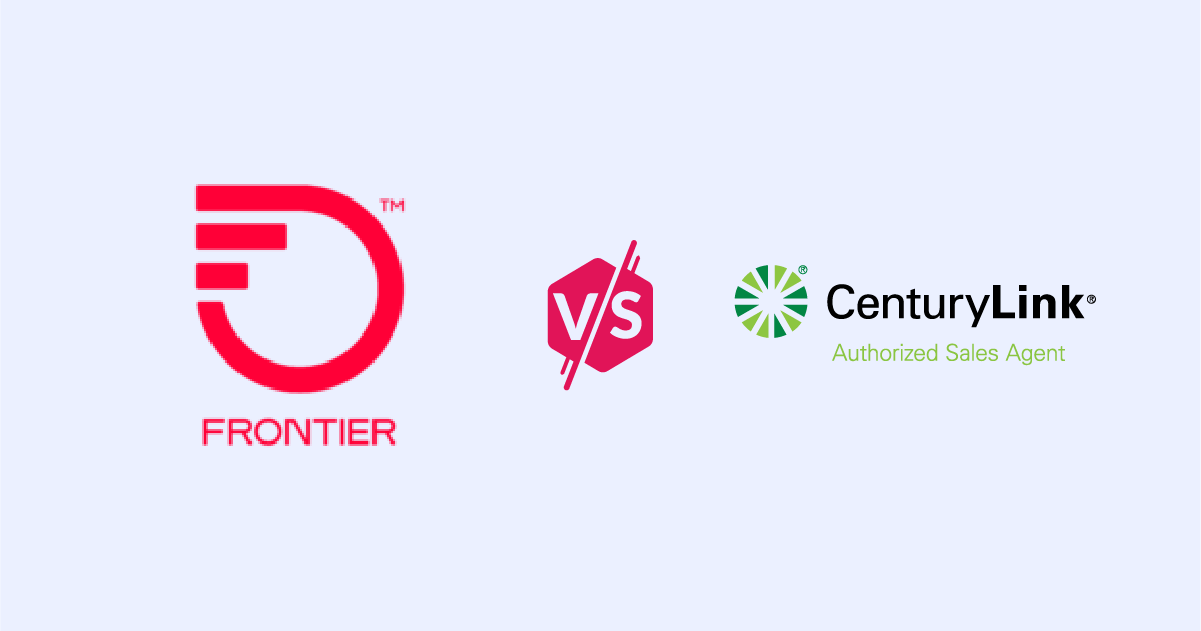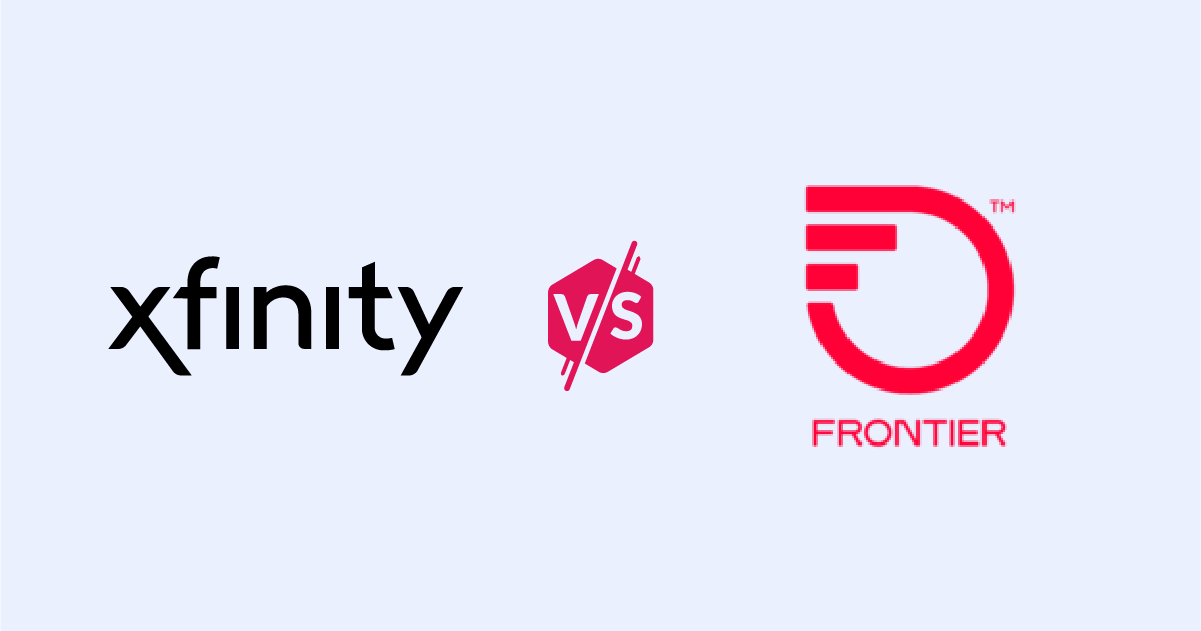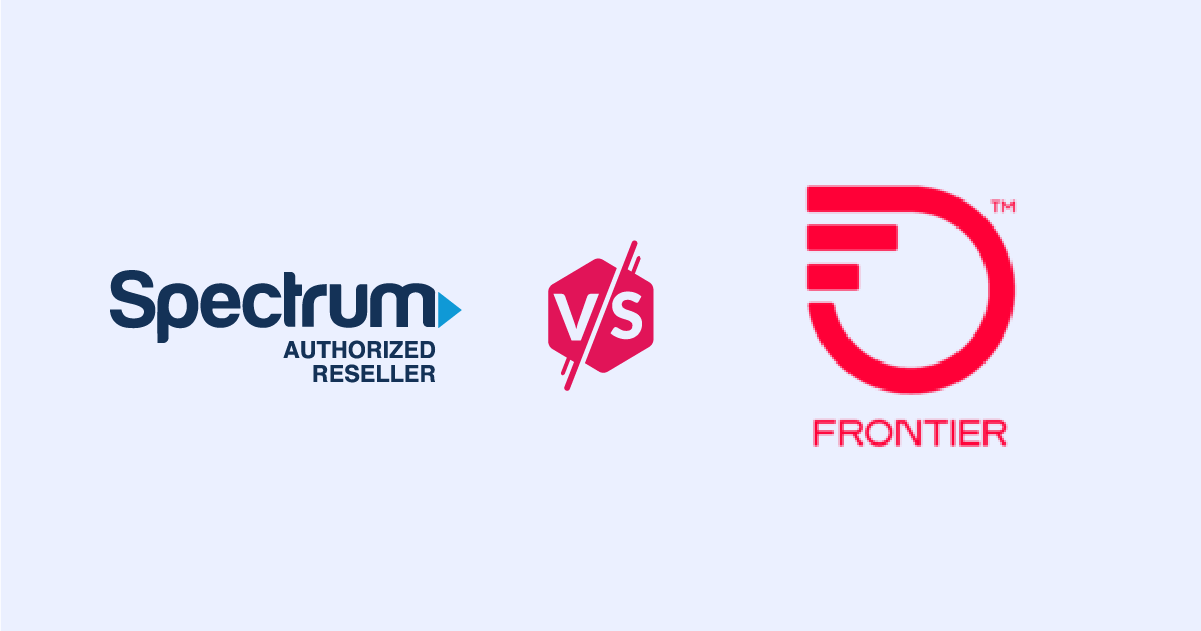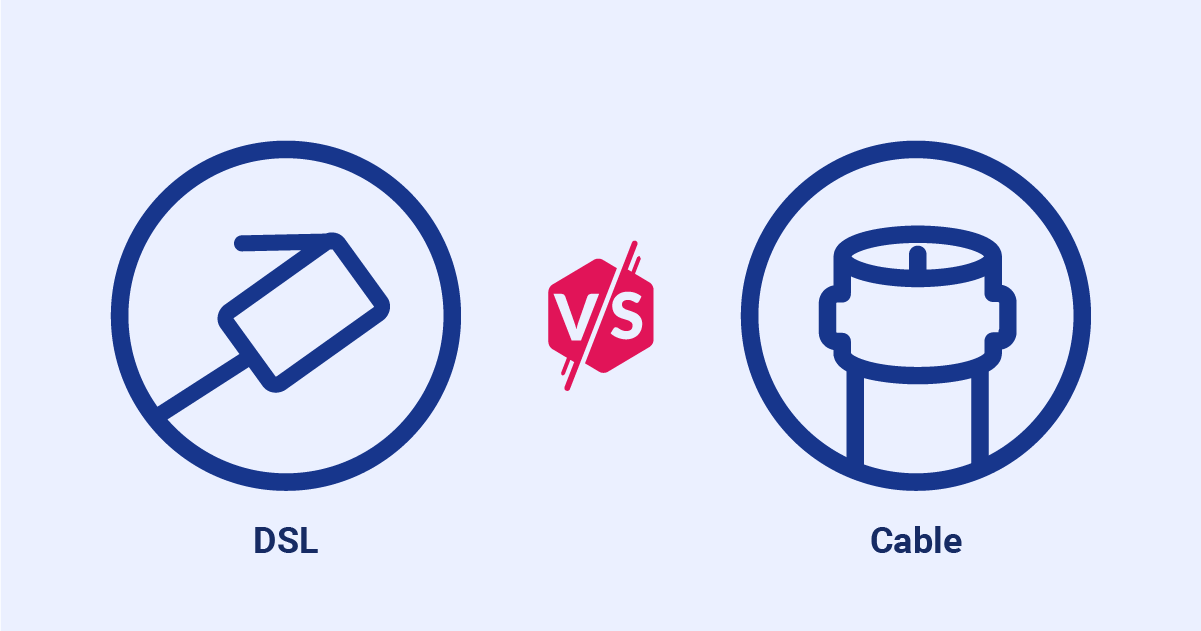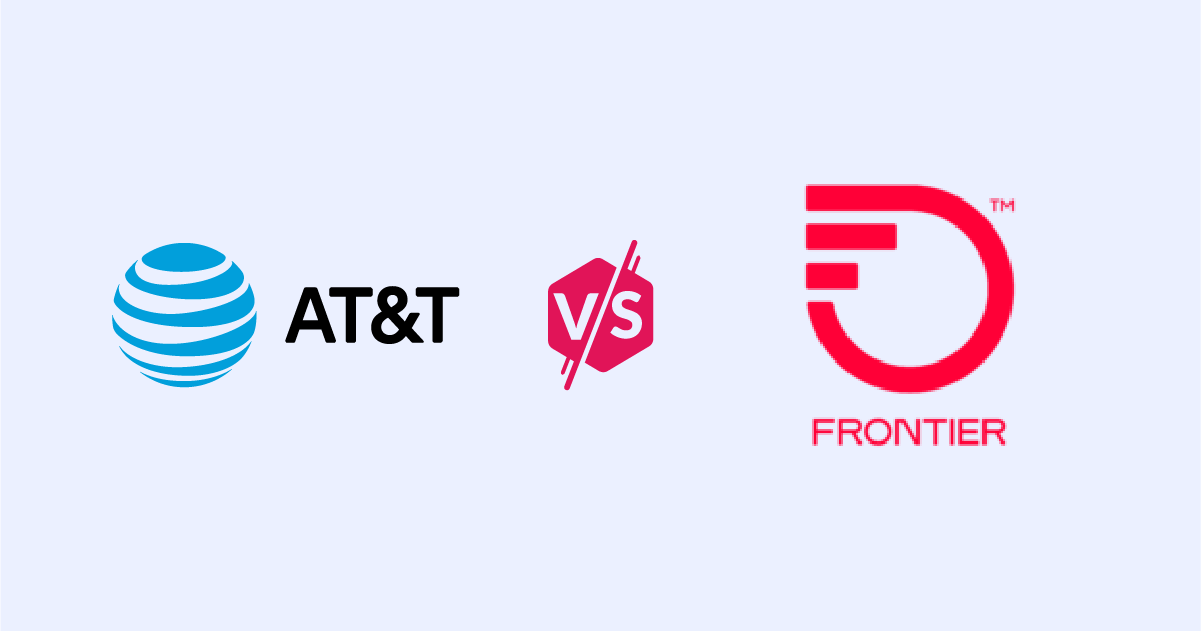Viasat vs. Hughesnet: Which Internet Provider Is Best for You?
Viasat offers the fastest satellite internet speeds, while HughesNet provides the most affordable plans.
Apr 5, 2024 | Share
Provider Comparisons (Versus)
-
Best speeds
- Customer Rating: 3.1/5*
- Price: $99.99–$119.99/mo.†
- Speed: 50–150 Mbps
- Internet type: Satellite
- Data cap: 60GB–Unlimited
-
Best prices

- Customer Rating: 2.9/5*
- Price: $49.99–$94.99/mo. for 12 mo.‡
- Speed: 50-100 Mbps
- Internet type: Satellite
- Data cap: Unlimited
Data as of 4/5/2024. Offers and availability may vary by location and are subject to change.
*Based on our annual Customer Satisfaction Survey
†Prices and availability vary by location. Installation fees, monthly equipment lease fees, and taxes may apply. After 100 GB of High-Speed Data usage, you still have unlimited access to Standard Data, which may result in slower speed.
‡Offer for 12 months. Service plans require a 24-month commitment. Equipment Lease or Purchase fees extra. Service plans require a 24-month commitment. Equipment Lease or Purchase fees extra.
Compare Viasat and Hughesnet head to head
For rural internet customers want flexibility, Viasat has no contracts or data caps and offers reasonably fast speeds, faster than Hughesnet. Hughesnet offers several plans that are cheaper than Viasat if you just need any internet connection. Hughesnet now also offers a Fusion plan, which provides low-latency connections for real-time activities like gaming and video chat.
Pros and cons: Viasat vs. Hughesnet
 Pros:
Pros:
- Faster speeds
- No contracts
- Unlimited data
 Cons:
Cons:
- Prices vary by region
- Speeds vary by region

 Pros:
Pros:
- Low-latency Fusion plan
- Unlimited standard data
 Cons:
Cons:
- Lower speeds
- Deprioritized connection when data runs out
Want to know if Viasat or HughesNet are in your area? Take a look by typing in your zip code below.
Plans and pricing: Viasat vs. Hughesnet
Viasat has just one plan, Viasat Unleashed, though speed and pricing vary by region. This plan comes with truly unlimited data, which means you don’t have to worry about overage charges, throttling, or having your connection deprioritized in favor of other users who pay for a premium experience.
Viasat plans and pricing
| Package | Price | Speed | Data cap | Order online |
|---|---|---|---|---|
| Viasat Unleashed | $99.99–$119.99/mo.† | 50–150 Mbps | Unlimited |
Data as of 2/29/2024. Offers and availability may vary by location and are subject to change.
†Prices and availability vary by location. Installation fees, monthly equipment lease fees, and taxes may apply. After 150 GB of High-Speed Data usage, you still have unlimited access to Standard Data, which may result in slower speed.
*Offer available to new qualifying customers. One-time standard installation fee may be due at checkout. Minimum 24-month service term required. Equipment lease fee is $14.99/mo. Taxes apply. Speeds are “up to,” will vary and are not guaranteed. Service is not available in all areas. Offer may be changed or withdrawn at any time.
Viasat Unleashed varies in price slightly and varies in speed considerably depending on where in the US you’re located. In general, you get a slightly faster and slightly more expensive plan than Hughesnet, with the added perks of no long-term contracts and unlimited data.
Hughesnet plans and pricing
| Package | Price | Speed | Data cap | Order online |
|---|---|---|---|---|
| Select | $49.99/mo. for 12 mo.† | Up to 50Mbps | Unlimited | |
| Elite | $64.99/mo. for 12 mo.† | Up to 100Mbps | Unlimited | |
| Fusion | $94.99/mo. for 12 mo.† | Up to 100Mbps | Unlimited |
Data as of 4/5/2024 Offers and availability may vary by location and are subject to change.
†Offer for 12 months. Service plans require a 24-month commitment. Equipment Lease or Purchase fees extra. Service plans require a 24-month commitment. Equipment Lease or Purchase fees extra.
Hughesnet offers two types of plans: traditional, satellite-only plans and its hybrid Hughesnet Fusion plan. Hughesnet Fusion combines satellite and terrestrial wireless connections to deliver internet. Using some additional equipment, Fusion correctly routes your connection over satellite or wireless, resulting in lower latency when it matters, such as with online games or video chat.
Hughesnet plans range in speeds of 50-100Mbps (including Fusion plans), which is the minimum speed at which a connection can be considered broadband. This is technically enough to do most things online, including streaming video in 4K resolution. During hands-on testing, however, we found that our connection’s average speed came in way below this threshold.
Hughesnet satellite-only plans differ only in the data cap. That makes it easy to compare plans to determine their value. With cheaper plans, you end up paying over twice as much per gigabyte of data, so although you don’t want to pay for more data than you’re going to use, you also get a better deal with higher-data plans.
In contrast to Viasat, Hughesnet plans have relatively small amounts of data compared to fiber and cable plans. Hughesnet’s slower speeds mean it’s easier to not burn through data as fast as you would on a wired connection, but it’s still important to get a plan with enough data to meet your needs—you don’t want to have to buy additional data on a regular basis.
All Hughesnet plans come with 50 GB of Bonus Zone data, which you can use between 2:00 a.m. and 8:00 a.m. It’s not an ideal time for most people’s daily schedules, but it does give you a time to schedule things like system updates, which could otherwise eat up your entire data cap for the month in one go. You can also use this time to download media like games or video, which you can then play back during daylight hours.

Deals and promotions: Viasat vs. Hughesnet
| Get free installation (with credit qualification) when you sign up for a qualifying home internet plan. |
 |
|---|
| Get a $100 Prepaid Card via rebate when you order a new unlimited data plan from Hughesnet. Terms apply and offer expires 3/27/24. |
Want to know if Viasat or HughesNet are in your area? Take a look by typing in your zip code below.
Extra fees: Viasat vs. Hughesnet
| Equipment Fee | Installation Fee | Other Fees | |
|---|---|---|---|
| Viasat | $15.00/mo. | $0.00–$300.00 | $250.00 Lifetime lease |
| Hughesnet | $14.99/mo. ($19.99/mo. for Fusion) | Free Professional Installation | Purchase price is $299.99 (449.99 for Fusion) |
Data as of 2/29/2024. Offers and availability may vary by location and are subject to change.
Both Viasat and Hughesnet offer unlimited data, though they differ in subtle but important ways. Hughesnet gives you unlimited standard data, so you always have an internet connection even after you hit your data cap, though it gets a lower priority after this point. If this happens, you can purchase additional data to bring your speeds back up to normal.
Viasat offers truly unlimited data, similar to how unlimited plans work on wired connections. Speeds are not throttled or deprioritized in favor of those who pay extra. There are also no overage charges or fees associated with your data usage.
Customer ratings: Viasat vs. Hughesnet
| Overall | Speed | Price | Reliability | Customer Service | |
|---|---|---|---|---|---|
| Viasat | 3.1 | 2.9 | 2.6 | 2.9 | 3.3 |
| Hughesnet | 2.9 | 2.9 | 2.6 | 2.9 | 3.2 |
Based on our annual Customer Satisfaction Survey
Viasat and Hughesnet came in neck-and-neck in our annual customer satisfaction survey, with Viasat edging out Hughesnet with a 3.1 rating overall from customers compared to Hughesnet’s 2.9. Viasat also came in slightly ahead of Hughesnet in terms of customer service.
Pros and cons of satellite internet
Both Viasat and Hughesnet provide internet access to customers using satellite connections. Traditional satellite internet has a lot of inherent limitations to speed, latency, and data. But it’s the only kind of internet connection available almost everywhere in the United States, making it an essential option in rural areas.
Providers are searching for ways to reduce some of the inherent problems with satellite internet. One potential solution is using low-Earth orbit satellite constellations like Starlink. Hughesnet’s solution was to create a hybrid, multitransport connection for its Fusion plans. Hughesnet Fusion deals with latency by using terrestrial wireless networks for latency-sensitive data. Your equipment automatically switches over to a wireless connection if you make a Zoom call or turn on a Twitch stream in order to deliver that data to your device without the lag you’d get using your satellite connection.
Learn more about satellite internet.
Data caps: Viasat vs. Hughesnet
| Data Cap | Details | |
|---|---|---|
| Viasat | Unlimited | |
| Hughesnet | Unlimited standard |
Viasat is currently the only satellite provider that offers unlimited data with no extra charges or restrictions. Hughesnet has unlimited standard data, but your connection is deprioritized when not using priority data. Just like other providers with data caps, once your data runs out, you get the leftover bandwidth after priority customers have been served.
Hughesnet doesn’t have a hard limit on its data, so you’d never have your internet shut off completely, even if you pass your data cap for the month. That said, it can potentially be pretty hard to do anything if you have to rely on the leftover bandwidth that other households in your area don’t use, so if you run low, it might be a good idea to buy additional data if you think you’ll hit your cap before the end of the month.
Contracts: Viasat vs. Hughesnet
| Contract length | Details | |
|---|---|---|
| Viasat | None | |
| Hughesnet | 2 yrs. |
Viasat has now ditched its 24-month contract and we think that’s great. This allows subscribers to cancel at any time without incurring hefty early termination fees.
Hughesnet requires a two-year contract agreement to provide service. This is a fairly long contract compared with most other ISPs, so it’s not a decision that should be treated lightly. Prices also go up after the promotional period, which can be an unpleasant surprise if you didn’t budget for the extra monthly cost.
Installation: Viasat vs. Hughesnet
| Installation options | Lifetime Lease Price / Purchase Price | Details | |
|---|---|---|---|
| Viasat | Professional installation from $0.00–$300.00 | $250.00 | |
| Hughesnet | Free installation with lease Free Professional Installation | $299.99 ($449.99 for Fusion) |
Data as of 2/29/2024. Offers and availability may vary by location and are subject to change.
Both Viasat and Hughesnet require professional installation, which makes sense because not just anybody can install a satellite on your roof. Hughesnet offers free professional installation with an equipment lease. The equipment purchase prices are pretty high, so we would normally advise against buying in this situation anyway. However, since Hughesnet requires a 2-year contract, equipment rental will add up, too. With Hughesnet, the equipment pays for itself in just over three years on a satellite-only plan, or in just under three years if you have a Fusion plan.
You can also get free professional installation with Viasat depending on credit approval.
Availability: Viasat vs. Hughesnet
Since Viasat and Hughesnet provide internet connections via satellite, so they’re both available almost anywhere in the US, though some plans are not available in some areas. Viasat prices and speeds also vary depending on where you’re located. Regardless, as long as your view of the southern sky isn’t obstructed by something like a mountain, you should be able to get service from either provider.
To see if Viasat or Hughesnet is in your area, enter your zip code below:
Final call: Viasat vs. Hughesnet
If you need an internet connection to do only the basics, Hughesnet’s budget plans give you straightforward pricing and might save you some money over Viasat.
For rural internet customers that want slightly higher speeds, more data, or the flexibility to change their provider, Viasat edges out Hughesnet for the top spot.
If, on the other hand, your main focus is real-time activities like online gaming and video chat, the Hughesnet Fusion plan gives you a much better online experience, even though it comes with a lower speed.
Methodology
Our HighSpeedInternet.com editorial team bases our analyses on customer input from our annual customer satisfaction survey, results from our speed test tool, and proprietary internet provider data on speeds and pricing. To strengthen our research, we look closely at provider contracts to get hard-to-find information on price hikes, data caps, and extra fees, and we keep tabs on the latest news reports and online reviews. When applicable, we also rely on our personal experiences testing these services.
More resources for rural internet users
Disclaimer
Product prices and availability are accurate as of the date/time indicated and are subject to change. Any price and availability information displayed on Amazon.com at the time of purchase will apply to the purchase of this product. HighSpeedInternet.com utilizes paid Amazon links.
CERTAIN CONTENT THAT APPEARS ON THIS SITE COMES FROM AMAZON. THIS CONTENT IS PROVIDED ‘AS IS’ AND IS SUBJECT TO CHANGE OR REMOVAL AT ANY TIME.
Author - Peter Christiansen
Peter Christiansen writes about satellite internet, rural connectivity, livestreaming, and parental controls for HighSpeedInternet.com. Peter holds a PhD in communication from the University of Utah and has been working in tech for over 15 years as a computer programmer, game developer, filmmaker, and writer. His writing has been praised by outlets like Wired, Digital Humanities Now, and the New Statesman.
Editor - Cara Haynes
Cara Haynes has been editing and writing in the digital space for seven years, and she's edited all things internet for HighSpeedInternet.com for five years. She graduated with a BA in English and a minor in editing from Brigham Young University. When she's not editing, she makes tech accessible through her freelance writing for brands like Pluralsight. She believes no one should feel lost in internet land and that a good internet connection significantly extends your life span.

